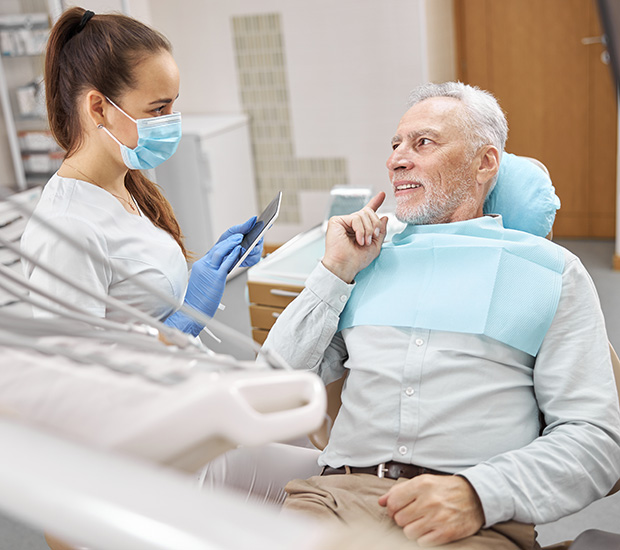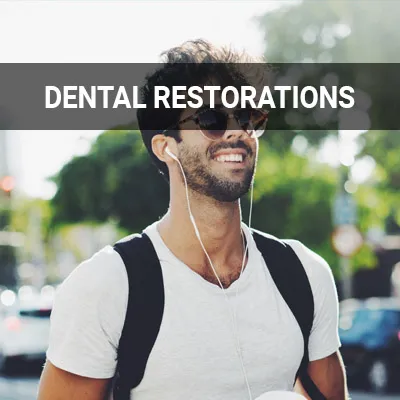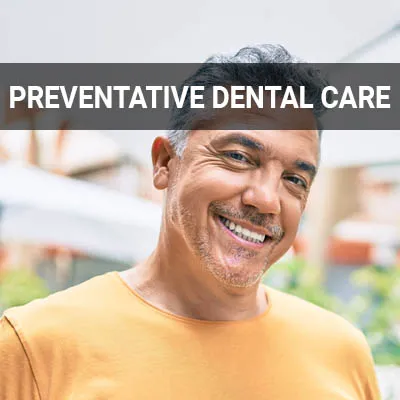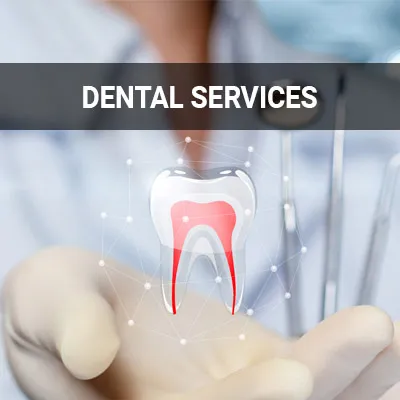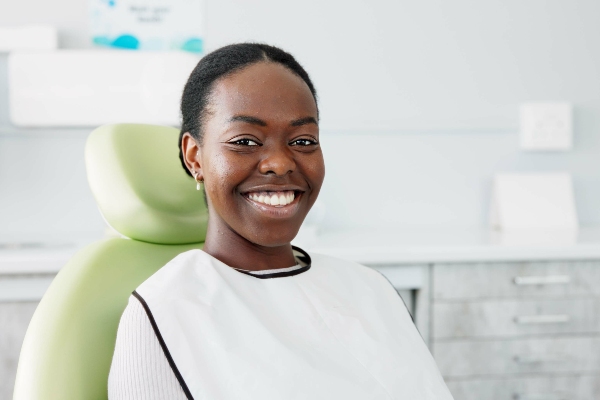Hard-Tissue Laser Dentistry Rosenberg, TX
While dental procedures can be nerve-wracking, we can implement modern techniques to reduce discomfort. Hard-tissue laser dentistry may shorten treatment time and improve patient outcomes. Hard-tissue laser dentistry allows our dentists to perform procedures with added accuracy.
Laser dentistry is available at KRB Dentistry in Rosenberg and the surrounding area. Our team uses cutting-edge technology to remove decay and clear infections. Throughout treatment, we ensure that patients receive the in-depth care they need. Call us at (832) 361-3929 to learn more.
Benefits of Laser Dentistry
Laser technology can treat a wide range of dental problems. With lasers, dentists use a focused beam of light to target damaged or diseased tissue. Lasers offer a high level of exactness compared to traditional tools like scalpels. Patients often experience minimal bleeding and pain after laser procedures.
Laser dentistry can also help patients struggling with dental phobia. Many patients may feel nervous or restless when their provider uses a dental drill. But lasers create far less noise and vibration than drills. They may provide a more relaxing treatment experience for nervous patients.
“Lasers offer a high level of exactness compared to traditional tools like scalpels.”
Standard Treatment Process
Laser dentistry resolves problems with soft tissues like the gums, cheeks, and tongue. It can also correct dental concerns affecting hard tissues like the teeth or jawbone. Hard-tissue laser dentistry generally focuses on removing the decay. Dentists may also use lasers to prepare a tooth for reconstruction.
The dentist may begin by using the laser to locate the treatment area. Then they clear away decay and destroy bacteria. Laser energy can disinfect the tooth as the dentist works. Once the dentist has removed any infection or decay, they may recontour the tooth. In most cases, patients do not need an anesthetic for hard-tissue laser procedures.
Afterward, the dentist moves on to the next stage in treatment. They may fill a cavity, apply dental bonding, or prepare a crown. The dentist finishes the procedure, and the patient can return home.
“In most cases, patients do not need anesthetic for hard-tissue laser procedures.”
Post-Treatment Care
Laser dental treatment is usually not painful, but patients need to give their gums time to heal after surgery. For the first week following a laser dental procedure, patients are advised to stick to a liquid or soft diet. They may return to a normal diet during the second week of recovery. They may also resume brushing their teeth, although they will need to be cautious while doing so. Complete healing can take anywhere from two to four weeks, depending upon the severity of the surgery.
“Laser dental treatment is usually not painful, but patients need to give their gums time to heal after surgery.”
Check out what others are saying about our dental services on Yelp: Hard-Tissue Laser Dentistry in Rosenberg, TX
Candidates for Laser Dentistry
Laser dentistry is an option for most patients. Hard tissue lasers can reduce discomfort and improve the healing process. These procedures may be particularly beneficial for patients who have dental anxiety. Most patients find that laser procedures produce less discomfort and bleeding.
However, patients with certain dental concerns may not be candidates for hard tissue laser dentistry. For example, patients with amalgam fillings may not be able to receive this type of treatment. In other cases, hard tissue lasers cannot perform certain treatments, and traditional procedures are the optimal option. The dental team can determine whether you are a candidate for laser dentistry.
“Most patients find that laser procedures produce less discomfort and bleeding.”
Questions Answered on This Page
Q. What should I do after my laser dental treatment?
Q. What happens during a hard-tissue laser dentistry procedure?
Q. Who is a candidate for laser dentistry?
Q. What are the uses of laser dentistry?
People Also Ask
Q. What are the pros and cons of soft-tissue laser dentistry?
Q. What are the benefits of getting a gum contouring procedure?
Q. What lifestyle factors can trigger gum bleeding?
Uses of Laser Dentistry
Many dentists routinely use lasers to repair dental problems like decay. Laser procedures can also help with diagnostics. With lasers, dentists can spot tooth decay and locate concentrated pockets of bacteria. Hard tissue lasers are also useful for tracking the progression of decay across office visits. These tracking procedures help dentists decide when treatment is necessary.
Lasers can also etch and reshape a tooth. Dentists can use lasers to help patients with misshapen, chipped, or cracked teeth. We can also use laser dentistry to prepare a tooth for further procedures.
“With lasers, dentists can spot tooth decay and locate concentrated pockets of bacteria.”
Frequently Asked Questions
Q. What is laser dentistry?
A. Traditional dental procedures use tools like drills and scalpels. Unfortunately, many patients find these procedures painful and frightening. Laser dentistry provides an alternative. Dental providers can target infected or damaged teeth using a focused beam of light. As a result, patients do not experience any shaking, noise, or vibrations during treatment.
Q. What are the benefits of hard tissue laser dentistry?
A. Laser dentistry offers a lower risk of infection. Patients who undergo these procedures often report less pain and swelling. They may also enjoy a shorter recovery time. Dental lasers also help prepare teeth for complex reconstructive procedures. Patients who need multiple procedures might be able to shorten their treatment timeline with laser dentistry.
Q. Is laser dentistry painful?
A. Patients who undergo laser dentistry procedures usually report little or no pain at all. Many laser dentistry patients can avoid anesthetics and sedatives. Ask our dental team for more details about pain-relief options.
Q. Will I need follow-up care?
A. Most patients recover well after a laser dentistry procedure. But in some cases, the dental team may schedule a checkup. During this follow-up appointment, the team checks for signs of infection or swelling. They confirm that the patient is recovering as expected.
Q. Is laser dentistry right for me?
A. Hard tissue laser dentistry is an option for most patients. But in some cases, traditional procedures might be a better fit. Our team can provide a personalized evaluation and individualized treatment plan.
Dental Terminology
Learn More About Hard-Tissue Laser Dentistry Today
Laser dentistry is a wonderful alternative to traditional dental procedures. KRB Dentistry can improve your overall oral health by using hard-tissue laser dentistry to resolve many common dental problems. Call us at 832-361-3929 today to schedule an appointment.
Helpful Related Links
- American Dental Association (ADA). Glossary of Dental Clinical Terms. 2024
- American Academy of Cosmetic Dentistry® (AACD). Home Page. 2024
- WebMD. WebMD’s Oral Care Guide. 2024
About our business and website security
- KRB Dentistry was established in 2014.
- We accept the following payment methods: American Express, Cash, Discover, MasterCard, and Visa
- We serve patients from the following counties: Fort Bend County
- We serve patients from the following cities: Rosenberg, Richmond, Cumings, Pecan Grove, and Pleak
- National Provider Identifier Database (1124126479). View NPI Registry Information
- Healthgrades. View Background Information and Reviews
- Norton Safe Web. View Details
- Trend Micro Site Safety Center. View Details
Back to top of Hard-Tissue Laser Dentistry
